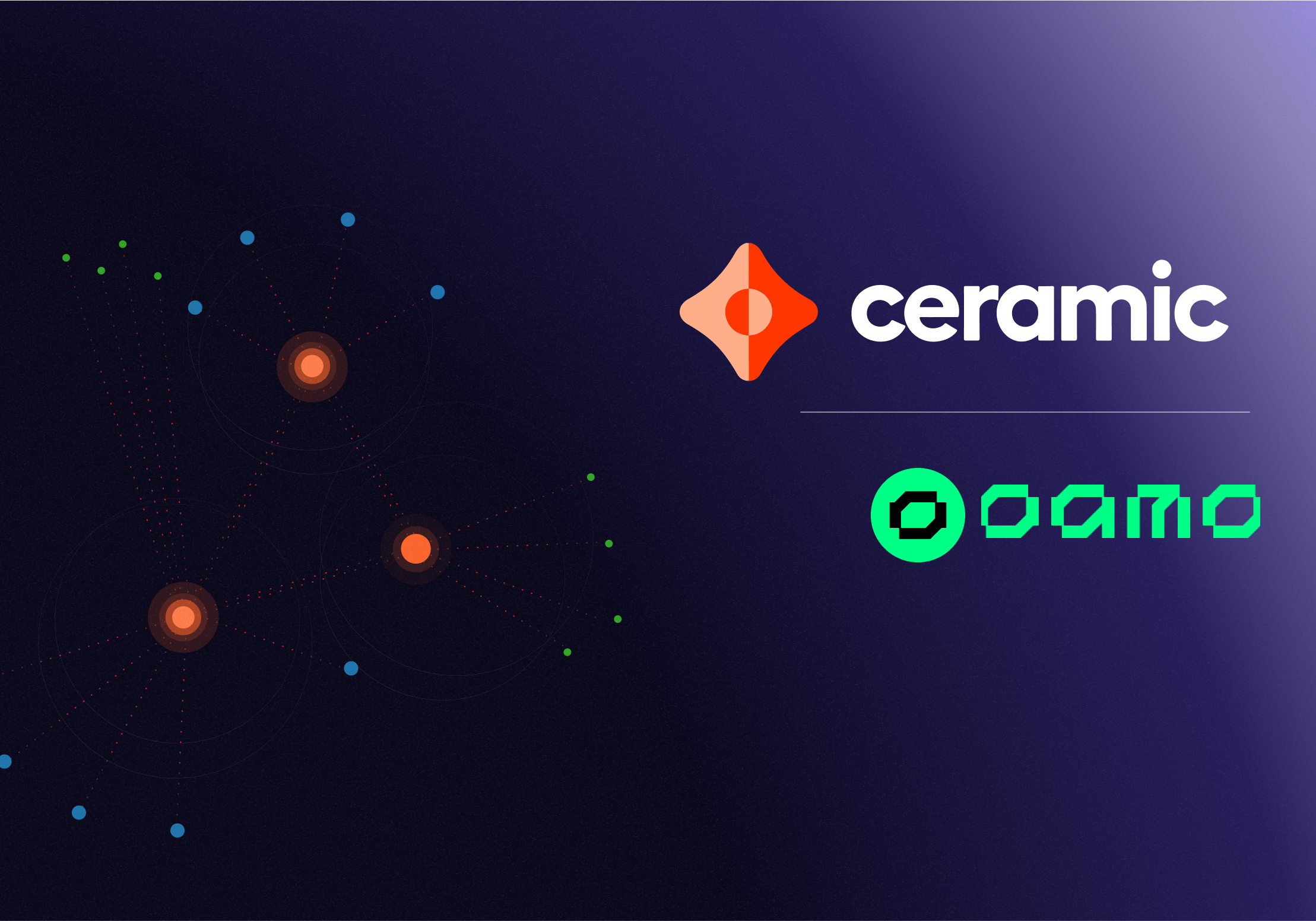Meet Oamo: The Platform That Lets You Own and Monetize Your Data
Learn how Oamo utilizes ComposeDB on Ceramic to create a data-sharing platform where users connect multiple wallets and social profiles while maintaining ownership and privacy.

Oamo, a decentralized data broker, aims to revolutionize the data economy by allowing users to own and monetize the value of their data. It replaces the outdated cost-per-click model, compensating users directly for their attention. This creates a fair and transparent data economy aligned with the trend of zero-party data. The platform enables users to share their on-chain and off-chain data anonymously with trusted companies in exchange for exclusive token rewards and promotions.
Data privacy is a growing concern for individuals, organizations, and governments around the world. Scandals, such as those involving Facebook and Cambridge Analytica, have highlighted the need for greater data privacy protections. Data brokers, who make billions of dollars by collecting and selling user data without their consent, are facing increasing scrutiny and regulation. Oamo aims to address these challenges by giving users control over their data and empowering them to monetize it.
As more of the world’s economy moves on chain, organizations need a better understanding of their target audience across Web2 and Web3 to reach consumers directly. Oamo foresees a new paradigm where companies build consensual relationships with their audience, with users willingly sharing behavioral information and accepting offers.
Ceramic and ComposeDB are at the heart of Oamo’s architecture—as they gear up for their launch later this year, users will be able to build their Oamo Profile (a Ceramic DID), connect their wallets across chains and social profiles, and generate credentials based on their on-chain and off-chain behaviors. These credentials can be shared anonymously with trusted companies for rewards, opening up the potential for personalized offers.
Digging Deeper Into Credentials
Unlike other teams building verifiable claims on Ceramic like Orbis, Oamo is built on ComposeDB, thus saving each credential output to model instance documents. Each claim is created by the Oamo server (for example, after a user has connected their Twitter account), which identifies the platform that the user has authorized, as well as when they authorized, and identifies it as a relation back to their parent profile instance (which is entirely encrypted to preserve privacy).
Observe the output of a real Oamo credential below:
Stream ID: k2t6wzhkhabz6atz6dxrkyaxy54by9ngwwxbdbfp532l6ya7vb89t5kbcb0syh
{
"status": "ACTIVE",
"platform": "discord",
"createdOn": "2023-11-22T15:53:05.501Z",
"profileId": "k2t6wzhkhabz55vfp9dyqyzyoremmu5fvan5aoo1aqg2grbkdk7sppmb2eivv2"
}
This particular credential establishes a relationship between this model instance document and the profile that the assertion is about (using profileId). It’s also identifying the verified platform in this case as Discord, alongside the status of the verification and the time when it was created.
If we pull data against the linked profile StreamID, you can see how the details are encrypted:
Stream ID: k2t6wzhkhabz55vfp9dyqyzyoremmu5fvan5aoo1aqg2grbkdk7sppmb2eivv2
{
"status": "ACTIVE",
"createdOn": "2023-11-22T15:51:57.623Z",
"updatedOn": "2023-11-22T15:53:14.275Z",
"encryptedSalt": "data:application/octet-stream;base64,Gu9DQLGI/n3ldwPcBKNCSuibcXjEBA8I9ftZO2HkeYFchC+vQLpct89DJoqXscf4qq3I3Ej4aBWKQIEFCvn/6dviw9Bz7puMHe8yaWy1OaUXk+q6l7ilY4yTDC7tiOryC1Z1KTh1c/XjecvL/anc7/gNKP/Li0xZLbXSM06dz18+lvlhaEigwm/jXR2hTBb/Q8nuFXzcAbQMGw0S06cYCTZg6e+ITHNvHgx0WXufN5VLfx5RmnNXu76GVKdgd13/reocUn2NZMLW/dLTDa6NsgSkJB2RxV3u3a8ALticsVNLVBKvrQbpyO/3Ssj97QVD/cxs0+66puFi0JygnUoXSbNl1UbCFngCt/9HjwLsLIHOov8uWNX6kxfcK0SwA/javmK1bjGstP74FNsiM3/iLw==",
"encryptedProfile": "data:application/octet-stream;base64,K0fl4WbOdRAmJHJl+peM7a96+jZ2TpuPlhfTfh1Rx/2Gvvw2pinaXnjsR6DD8XizG9OFZvwgT0CDigXZwymR1bRDHi1t/dPbcu0pd9ymeG91xP+8KsrVJuubZZ6GljH3Y5bw+pxCzRNCCjvWX0ZVKU+qNHuAunWedEar7D3OjYSnMP/67sRg14EDGigQyXPZ0nkysdxn7KCjtDvooPmirkyq2mkY8kd63mazp1SXVanD/McpNWpiB8mW/zy5YnpB55byEIY9o56q4dIwOhvfLOu9R7Ybx5Q3baZ8tak8V5BTe+ULDLeje+zQ9G0s0kHEgPCcH4Ntg/foR4EZk/j3qkJO0QC9A02uu4VmUAnkCTB1vEJi6DzSUkFAIFKrpNjkM287SMuil+dUXFS92MmC576K0HZ/l8e0dTo22eKGRzsvzcCsuaM1Mn5Ld+LJaVD5JHM9hGGuZL4R5pEYo2qVzJrlSqoTm5ORVn9H5S11/+n5DuYrzKf3u+bPKUpz5v6wTGwoKVqDFUDwoYercfHXRdedGdkti437SV0VNzmxzm3XuSfwE+c+urpDayEm8TF5FMArAoQpAtBqgRWjoUymcLRaRYbSJzLtt3FQPODZ3I8ynERk1zFs4Wb702LKvZ3XoSsQukiORLqB59Ysg+u+XrOWm2iKmjrDBJmrLQAEPluiJ9DjtxNELG+Lphx27D66w86juz32CvfVe6FnLQ7C5DDB52dIrxl9kXbEgDW4D1uGmvPuKCoUjLLQM02TffT69clJH1bsSE3rx6Lkk1SXV07qSyMPjMHVIOqIpsls1RkpZ0sLyKSluirTlgNcnZnHI+FPcsdwCcylPRrWt4gYl2CR4CunpjeOt5cBak/KsmNANKl/QbcRPCfsdyUK4yE6KZ6gYV3an+qTTucYJVEyfxT/PRxboyrcl+RDoToKRfdMZe0SsGP5v1uvlidu1Jq3Zy9Am+mGwIWi4V0ymp8IL820PKc5a0qGKYAcEkSIxiv8sJgaoBRg2acyK0hn5ZiFiTLmU5jWFjI0UKVxBxPkDMAsVwNmZocAJhGoDXFAk0++yJKslPBtZFQKEQlsUgoaGtQz3sV+dTK875Tw7EXvNacPr5tSlaMtfRrvpJv1EIX1j8Fx+/NSTwzw3dMgY9JZ0M6XwDIPp2i60HQPWfwwYw+W1EFdjBvgkRw+pHF2GXPE8LQUyFmNqQEAst4MQ+4BApJyD8dNyJcRLoqRjvjV5I0TuGq7FL3USDBsYbIXo1X7LJGwvTaOudVt0ga9JuDb3qpJubaetIKGgIF4ZnD42/5EKBmxL9fb7YaQI3KYaLSxS70NHRBcywzLoXmsiEkpdBgUkbizdbbf/4uAksYHjTN7naaxWXcn1dWU5pAhxVd/bcZMrU6cknONNv0qxgYIR74tMg3kyXbmlT37cRhq2dLX9sYDaYfb1hl7vryJpBqPz/QODaU47Ittu8go32JfNBCWpS5B24xWEU4NpB5haqbvyu5NDHJPC91MkwLkoo8wJMQS1MicMM1D8/fPH+dkUJAkunnOtgBCgnBhm5b2F9GTAm6rzAcUHkTdz6A3pDfM8a06c/UENiUpdM4wrCpVXb957iG89ZNthEFqMqQ1M5oaRCarh5WvAkZOBnwtztAA7+2OMr3n+dx9k3gxc7NRA43rf4WaH3QWa7SD/jn/LUF1Ij/m+n2usfrNWh8bhegXQy55Q/v5G1Id4Sz3lMazvkEcxesea747AvQq6XMPos9DSCDFUo/rFXzB3j8Lrn4HDEAecytCadJpkYN8jtDV1Hu6GEz8RNUXhkS5WASU72UrUpfGCW3zMPoUlD/jd8Zah03Ikth2bwP4x2EXh1KgqE1GqfYJa3m2nnkjZgaF5JNOuly8RiEgdxKMUwlj/ktdHO7OTViuROX2wSzU90AzntPVKK3OazCP6z2NAcNsHAMWjHq4sYCXrghq1QrGix1jr934FjK3BvXXoVTcf/j5VB+WnfmUujcX9zDeEmJM04J5s8ShYfLhLAm0ssi1BghVwWjn1P5sEOuVmJiDNZMoQiOq3EnV59S90jfPVeMSRK7EkglydmrBbbwYrsdOqZ7v6P/D80vEAqC0cT9M2B++EJl1na4iC3DTCwBoGYahbec04imO3efjlRDFxiasq+Ka9Uq7/iOE5XztwLQF8tPnlLM5xacQuYskq5qNjIl1rOwDThzjLEGYwseGwC7a+IVnvZwt906keu7AuQ+dF91xJSY+/IdbCml0K9G73oPD7xGUZlUjLdT/8kqVP2mrDyyWnPOEHizo9NUi/5YFnSJzAXwoKkUXIrcrAUAKDRh9TmtXZ7P31T7CazfQU4n/IgnDNvG1ATgXQgp4Bgn3h25tazZvdrvLWSp2e9Ip2UkD4ntcbMmwnfynk4kxLNp6kWL3L+9RLfzp79/6mcLIgyvhU8Zex1KiMdM4IKxPG6o4rLBvbHkCz7VIrX3OBR7WH/9SxXXZpxHNZDxURgmvZD7ZliZIDU3ogf6UpDbU/S6Vvwf8TLTGCnZ2k8AkWmZTpg2IolIfPUvvw4kxyj2mZWnofUAr6rTBOe7RyOPRnrnMujryLsfzXrSssyuD2wTM84yjAIqKi3bLtGmvhrdp9wU96Zt1XL37a07i8xH5yhJiT11Ykw7CzmVL5fDKhB4+p0IFiumBRv0zGuP+k6hmds10dIwAvDMyI1+tCYBKtqkfBfGiAnd9kvbkOb6LVSFtT75DvkvVWqMQn4Wdfc+S1GrSJxGajrCliK+vADcrt3y2z8UMs5MbLOjmHj3Q4lar1irj+PP4U47RfCsakLxZux3hi0OBuhgecVtsXRc7pj1qsXtna1K/5Agd75XAtgPBf3ITyWVaFp3cFgjB65hh7gGfc14KxmSqba2RFO9glWMgPZ8dj1Fa64+rYznfwTbKXe9+uw0vBFXyHGD268VDN9l1wCf4ZqGavgwHNGsQX1zXJY0zNxN2WCsm5T2yQbtqp/y3xTr/c2ysPOLiT/MHWMUg7GmRvnUHaLRhCX0rRB+4F1YECm33Yye8dZvEI5rAaloSWN9iJCSTRiTJHiPBwwsT",
"encryptedSaltSymmetricKey": "8d67f89398458c9e3bf9626c52fd97200b79e557b97697eb7244758acde41f8aafd2134735af002f2c1af9704fed600c266317712723a300a7e2a8033581e409d71d977f6afc3c29134a1fb69b79b7ccadfcf28b9f0a347a0f45381752a3a08000333245e64f452be68822b232da33e8a43f0c637e01d8dc561aa26bcc36be1b00000000000000207418fe95faeb542c48168288b9880cb4f24ea92052c17caa9bc543a2249ffff6f3a87ab75a7f9ac9b5d8a1bc74ba03aa",
"encryptedProfileSymmetricKey": "55d1eaea9ec4edb192bab9c27c7a321c22754db1e3a51c6e7c6d0dca3d63c1850a2ca973f82289cbfc8167379ab5a7061e4ac804fc7aad3f451c93271bba11f89c02979746f1cf699f8aecef7dba38aaa69dc3e71314a2e5f22df8b975a115a08956998018286068ca49c20d24aabb0f0d6c34d0f8660696f81e73c72c1209ed0000000000000020f2e64c4414e3d8c835f7a1e9bac99505b40e871289fcc856a76156667be6ea6d0e66ca689ae7d902786d8da5cba22a97"
}
Oamo in this case is leveraging the native functionality and access control conditions ComposeDB enables to developers, rather than saving the full EIP712 or JWT signature output of a Verifiable Credential or attestation to the body of the ComposeDB model instance.
User-Centric Design: Oamo's Use of ComposeDB on Ceramic for Data Ownership and Control
One of the significant challenges that Oamo faced in its mission was ensuring data privacy and user control. The founders wanted to create a data economy where users truly own their data in a private manner and share behaviors with selected companies without revealing any personally identifiable information. One key challenge was designing a data-sharing platform that allowed users to connect multiple wallets and social profiles to a single profile, while still maintaining ownership and privacy. Oamo also aimed to enable companies to send personalized offers without revealing personal information. These challenges required a robust and secure solution that could handle decentralized data storage, encryption, and messaging capabilities.
ComposeDB on Ceramic became the backbone of Oamo's architecture. Users create their Oamo Profiles as Ceramic DIDs and generate verified credentials that align with their on-chain and off-chain behaviors. User credentials are then stored in ComposeDB and encrypted with Lit Protocol, ensuring users have complete control over their data. This solution allows companies to send personalized offers to users without revealing personal information, ensuring user anonymity while reaching the target audience trustlessly.
"Ceramic accelerated our product development process exponentially by providing a robust ecosystem of tools that covered all our design goals. We believe it’s the only solution that could power true private ownership of data spanning across Web2 and Web3," - Yannick Folla, CEO & Co-Founder of Oamo
Oamo's founders had been following Ceramic's journey from the early days of SelfID to Ceramic's current all-in-one package of DIDs, verified credentials, multi-chain support, decentralized data storage, and encryption support via Lit Protocol—this array of tools and capabilities perfectly aligned with Oamo's core design goals.
Building a Secure Data Economy With Ceramic and Lit Protocol
In Oamo's architecture, when a user generates a DID, the data saved in that stream is in plain text and publicly accessible. Given the sensitive nature of user data, it's crucial to encrypt this data and set permissions to restrict access. To achieve this, a user creates a salt and generates a DID using that salt. Then, the backend creates the requisite dataset and sends it to the user for encryption using Lit and storage in Ceramic. During the encryption process, the user sets permissions so that only the Oamo smart contract has decryption rights.
"Through our research, we saw Ceramic as the only viable solution that would package DIDs, verified credentials, multi-chain support, decentralized data storage, and encryption support via Lit Protocol. It’s an all-in-one solution that ticks all the core design goals at Oamo."
This approach ensures user data privacy and gives users control over where their data is stored. Ceramic's unique capabilities, such as Decentralized Identifiers (DIDs), verified credentials, multi-chain support, messaging capabilities with ComposeDB, decentralized data storage, and Lit Protocol encryption, made it the clear choice for Oamo.
Get Involved
If you're interested in participating in the new data economy, where you truly own your data and its value, join Oamo's allowlist today and prepare for the upcoming launch!

